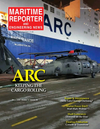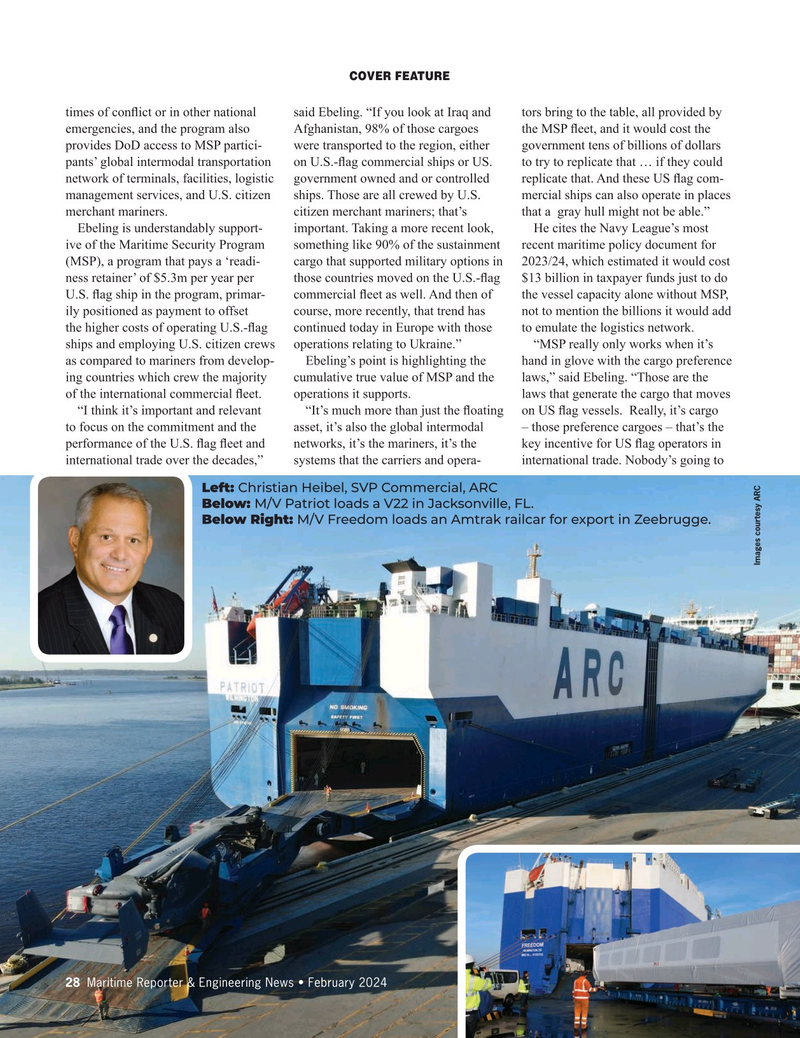
Page 28: of Maritime Reporter Magazine (February 2024)
Read this page in Pdf, Flash or Html5 edition of February 2024 Maritime Reporter Magazine
COVER FEATURE times of con? ict or in other national said Ebeling. “If you look at Iraq and tors bring to the table, all provided by emergencies, and the program also Afghanistan, 98% of those cargoes the MSP ? eet, and it would cost the provides DoD access to MSP partici- were transported to the region, either government tens of billions of dollars pants’ global intermodal transportation on U.S.-? ag commercial ships or US. to try to replicate that … if they could network of terminals, facilities, logistic government owned and or controlled replicate that. And these US ? ag com- management services, and U.S. citizen ships. Those are all crewed by U.S. mercial ships can also operate in places merchant mariners. citizen merchant mariners; that’s that a gray hull might not be able.”
Ebeling is understandably support- important. Taking a more recent look, He cites the Navy League’s most ive of the Maritime Security Program something like 90% of the sustainment recent maritime policy document for (MSP), a program that pays a ‘readi- cargo that supported military options in 2023/24, which estimated it would cost ness retainer’ of $5.3m per year per those countries moved on the U.S.-? ag $13 billion in taxpayer funds just to do
U.S. ? ag ship in the program, primar- commercial ? eet as well. And then of the vessel capacity alone without MSP, ily positioned as payment to offset course, more recently, that trend has not to mention the billions it would add the higher costs of operating U.S.-? ag continued today in Europe with those to emulate the logistics network.
ships and employing U.S. citizen crews operations relating to Ukraine.” “MSP really only works when it’s as compared to mariners from develop- Ebeling’s point is highlighting the hand in glove with the cargo preference ing countries which crew the majority cumulative true value of MSP and the laws,” said Ebeling. “Those are the of the international commercial ? eet. operations it supports. laws that generate the cargo that moves “I think it’s important and relevant “It’s much more than just the ? oating on US ? ag vessels. Really, it’s cargo to focus on the commitment and the asset, it’s also the global intermodal – those preference cargoes – that’s the performance of the U.S. ? ag ? eet and networks, it’s the mariners, it’s the key incentive for US ? ag operators in international trade over the decades,” systems that the carriers and opera- international trade. Nobody’s going to
Left: Christian Heibel, SVP Commercial, ARC
Below: M/V Patriot loads a V22 in Jacksonville, FL.
Below Right: M/V Freedom loads an Amtrak railcar for export in Zeebrugge.
Images courtesy ARC 28 Maritime Reporter & Engineering News • February 2024
MR #2 (18-33).indd 28 2/6/2024 9:17:05 AM

 27
27

 29
29
